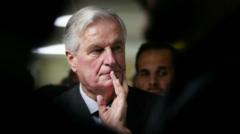French Prime Minister Michel Barnier stands on the brink of a historical political collapse as he approaches a no-confidence vote at the French National Assembly scheduled for around 19:00 local time (18:00 GMT). If the vote proceeds as anticipated, it will signify the dissolution of Barnier's government, marking him as potentially the shortest-serving prime minister in France since the establishment of the current Fifth Republic in 1958.
Appointed by President Emmanuel Macron just three months ago amid considerable political flux following an inconclusive parliamentary election, Barnier's position has always been precarious. Although President Macron is currently on a state visit to Saudi Arabia, he maintains hope for Barnier's survival, emphasizing the necessity for government interests to supersede partisan disputes.
Despite Macron's support, Barnier faces formidable opposition from the left-wing New Popular Front (NFP) and Marine Le Pen’s far-right National Rally (RN), both factions declaring their intent to vote against him. The current situation exacerbated following Barnier's controversial decision to employ special powers to advance the 2025 budget without sufficient parliamentary backing, a choice that has drawn ire from both opposition groups and rendered his government’s survival improbable.
At 73, Barnier's attempts to navigate a divided National Assembly—where no single party commands a majority—have been fraught with challenges. His centrist political alliance was reliant on collaboration with the NFP or RN to implement policies, but both factions have remained firmly opposed since his appointment. Their dissent towards Barnier’s austerity-focused budget, which involves significant deficit reductions, laid the groundwork for today’s political crisis.
In a final effort to stave off the no-confidence vote, Barnier addressed the nation, urging MPs to consider their votes in the context of national unity rather than partisan agendas. Nonetheless, expectations lean towards the motion passing, which would lead to the first government collapse via a no-confidence vote in France since 1962.
Should that scenario unfold, Barnier is expected to serve as a caretaker prime minister, while President Macron embarks on the challenging quest for a replacement. The last appointment process took two months and may once again complicate the political climate, as Macron struggles to identify a successor who can garner broad support.
There are mounting calls for Macron to resign from various factions as his presidency continues until 2027. Despite the turmoil, Macron affirmed his commitment to fulfilling his duties until the end of his term, asserting, "I will honor the trust of the French people... until the very last second."
The unfolding political scene in France signals significant implications not only for Barnier but for the broader political establishment as the nation grapples with fragmentation and shifting alliances.


















